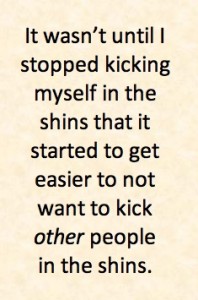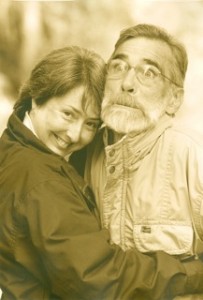My cats have trouble with boundaries.
Not with spraying to mark them, thank goodness. But with what issues are theirs – or not – and what issues they need to get involved in – or not.
I first discovered this a few years ago, when I stepped on Rocket’s foot. She screamed, and the next thing I knew, Abby, who is only 2/3 Rocket’s size, exploded on the scene hissing and spitting and ready for a fight. I thought she was there to protect Rocket but, no, she was just reacting.
I’ve also discovered that when neighboring cats occasionally come to the windows, my indoor cats get very territorial and try to fight with them through the glass.
That’s not very surprising. What is surprising is that Abby and Rocket then turn on each other. They will get into terrible scraps, taking out their frustration and adrenaline on each other.
This happened a little after six a.m. this morning. I awoke to the sound of Rocket and Abby hissing and screaming and scratching at each other. I ran into my office, where Rocket had Abby pinned on her back. The term “the fur was flying” describes it pretty well. I waded into the thick of it although, as I grabbed Rocket and tried to separate them, it occurred to me that maybe this wasn’t my brightest idea ever. I wasn’t about to let them hurt each other, though; I managed to loosen them and Abby ran off into the other room. I also realized that there was cat pee sprayed all over the rug. Pew! This was not a little sibling rivalry spat.
My office has windows along one wall, and patio doors along another. I realized that there was a cat outside the door, watching this whole scene. As Rocket prepared to lunge at it, I turned on the outdoor lights, banged on the door and scared it away.
Well, the girls (and I) slowly calmed down, and they un-puffed and began licking themselves. (It’s kind of hard to tell when Abby is puffed, since she doesn’t have a tail – it’s more about body language. Anyway.) Luckily I keep their claws clipped and, although it was time for a trim, I haven’t found any major damage. Rocket has a scratch on her ear, and I’ll continue to check them for bite marks and keep an eye on them for a couple of days.
I wonder, what is it about a cat’s brain that allows it to transfer that animal instinct onto its sibling and ally? Is that a lizard-brain thing? Why aren’t they able to say, “Whoa, *Boundary*, she is my pal, I’m not going to whap her when what I really want to do is whap that trespasser”?
And I wonder about times I have taken out my emotions on others, on innocent bystanders and on people who manage to mash my buttons. I wonder: Is it the same lizard-brain thing that causes us to project unresolved shit onto the people around us?
Luckily, we are not lizards (or cats), and we can learn to see what we’re doing and work out our issues in a productive manner as long as we are conscious of what is happening.
Well, the cats have had their breakfast and settled into naps. I have sprayed cat-smell remover on the carpet and liberally sprinkled the room with baking soda. I’ve vacuumed once already, but the smell, like my wonderment, lingers on. I’ll have to work on this for a while.
Have you ever observed someone treating someone else as if they were the object of their ire, even though they were an innocent bystander?
Have you ever been the innocent bystander?
Have you ever been the one acting out on someone else?
Have you ever wondered why we do this?
What questions can we ask when we feel dumped on to find out, Did we really invite that dumping? Or is the other person really reacting to something else all together?
Please share your thoughts in the comments.
If you like what you read here, please tweet about it or forward the link to one other person. Thank You!




 Twitter
Twitter LinkedIn
LinkedIn Facebook
Facebook